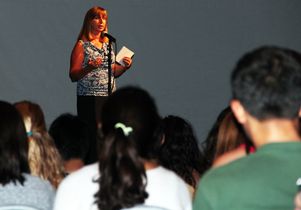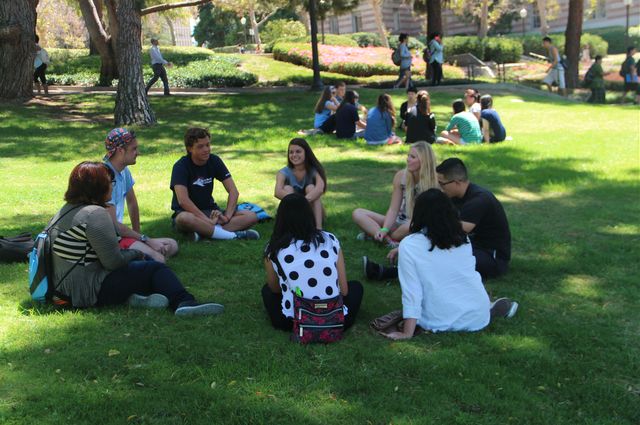“What is consent?”
That question was one of many posed by Roxanne Neal, director of New Student and Transition Programs, during a recent UCLA new student orientation session focused on sexual assault, sexual health, and alcohol and substance abuse.
Consent, she explained, requires three components. “It must be informed, it must be voluntary, and it is revocable at any time.”
When she asked who in the audience knew someone who had been sexually assaulted, hands rose from all sections of Ackerman Grand Ballroom.
For the past quarter century, UCLA’s New Student and Transition Programs in the UCLA College’s Division of Undergraduate Education has been addressing this question and others related to sexual violence, sexual health, and alcohol and substance abuse during orientation as a way to help students better navigate their first year as Bruins.

For many students, this is their first time away from home, and many will be dealing with situations they may not know how to handle, said Neal, who will educate roughly 9,000 incoming freshmen and transfer students this summer about these topics, which are now being presented in accordance with state, federal and UC mandates.
In an effort to ensure that all students benefit from this education and awareness program, it has now become mandatory; a hold is placed on a student’s record until he or she completes the requirements in person and/or online.
With education comes power
Freshman students who attend UCLA orientation participate in a two-hour session that provides a starting point to talk about facts and issues, including the definition of consent, ways students can intervene if they witness a situation that may lead to sexual assault and strategies to prevent assault from happening. Organizers also aim to foster a culture in which students feel empowered to report sexual assault.
“This information has been included in orientation for more than 25 years to ensure the safety and well-being of new students,” said Neal, noting that transfer students participate in a one-hour orientation session led by the Dean of Students Office and UCPD that addresses many of the same topics. That step was taken many years ago when data determined that “the most vulnerable time for sexual assault occurs during the first few weeks, months and year of college.”
UCLA is one of the only campuses to cover this topic consistently for 25 years with 95 percent attendance by first-year students at orientation, Neal said. “No other campus has done this, and certainly not with the attendance rate that we have had.”
Multimedia approach encourages active learning
Using a mix of videos, slides and skits performed by Neal’s staff, the presentation and open discussion also offer information about confidential resources for students, including Student Legal Services, CARE@CAPS and the Rape Treatment Center, as well as reporting options. Students can contact the Office of the Dean of Students, the UCLA Police Department and/or UCLA’s Title IX Office.
“Students experiencing crisis situations are more likely to reach out for help if the type of assistance available meets their individual needs and comfort level,” said Janina Montero, vice chancellor for student affairs. “So familiarizing students with the wide range of care and support options available at UCLA is of critical importance, especially when a student believes that she or he has been the victim of sexual violence.”
At orientation, the session begins with a screening of a recently produced UCLA video that urges survivors of sexual assault to speak up and take a stand against such crimes and highlights available campus resources.
“Every year, we evaluate whether the manner in which we present the material to the students is effective and engaging so that it is as memorable as possible,” said Neal. “We have always valued live presentations with interactive methods and multimedia, and it has been highly successful with our students. The format also allows students to process what they hear — during large and small group discussions — while also being sensitive to survivors of assault.”
On their way out, students receive a copy of the newly created Bruin Support and Safety brochure, which highlights reporting options and confidential resources, as well as general information for students in distress. They’re also given a wallet-sized True Bruins Care card, a quick reference guide to information on resources and support for sexual violence and other issues.
Incoming freshman Edward Pedroza said he appreciated the straightforward approach taken by organizers toward the realities of college parties, drinking and sexual relationships. “It makes you feel comfortable that the staff is in touch with what’s really happening.”
Pedroza and a group of students joined UCLA senior Skyler Ferry, one of many new student advisors, for a frank, but informal discussion after their session on Tuesday morning. These small group discussions provide students with another opportunity to share ideas and opinions and to ask questions.
In addition, all incoming transfer students — as well as all freshman students who do not attend campus orientation — must complete “Think About It,” an interactive online program that reinforces messages and lessons related to sexual violence, alcohol and substance abuse and stalking, using real-world scenarios. All new students also take a “Think About It” refresher course just prior to the start of the fall quarter, said Neal.
Beyond orientation and into the school year
Fostering a safe and respectful campus community extends well beyond orientation and refresher activities.
Once students arrive on campus, the Office of Residential Life, in collaboration with Counseling and Psychological Services, the Title IX office, UCPD and the Office of the Dean of Students, concentrates on raising students’ awareness about personal safety, healthy relationships, UCLA behavior expectations and available support resources.
They accomplish this by offering educational programs and workshops, facilitated floor and community conversations and using many different ways to get the message across — digital displays, bulletin boards, resident assistants’ room doors, websites and the residential TV channel. Students receive refresher education about consent, bystander intervention, the role of alcohol and drugs in sexual violence, self-defense skills, confidential campus and community resources, and reporting options.
These efforts start as soon as students move into the community and continue throughout the academic year.
UCLA also provides additional sexual assault and sexual health education to student athletes and members of fraternities and sororities — populations that tend to be at higher risk for sexual violence on campus, said Debra Geller, UCLA's executive director of community standards.
Training focuses on dating, domestic violence, stalking and prevention education for sexual violence, including advice on how students should respond to others who have been victimized.
“This is something we care about deeply and want to get right,” Neal said. “It isn’t just about making sure we are in compliance as much as it is about making sure students are safe and that we have a respectful community.”





